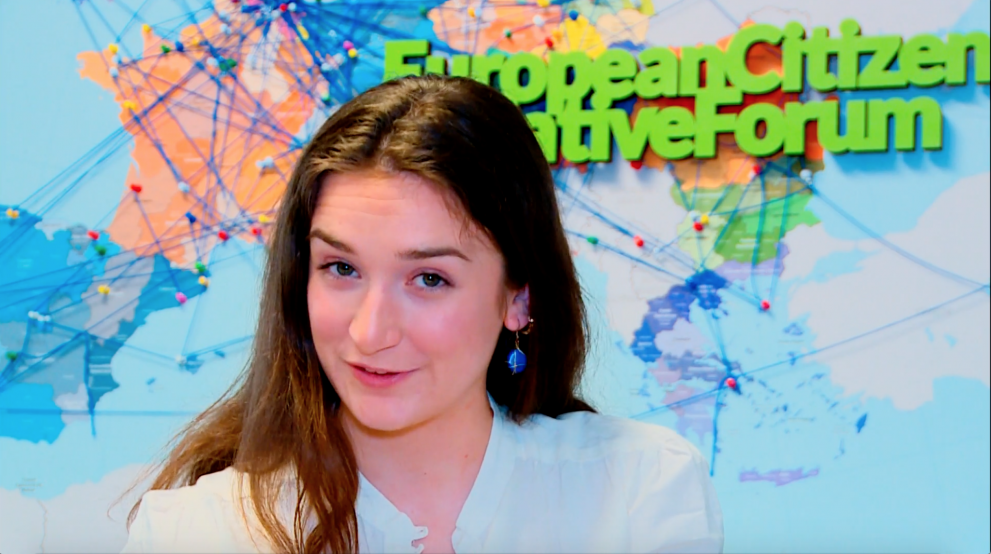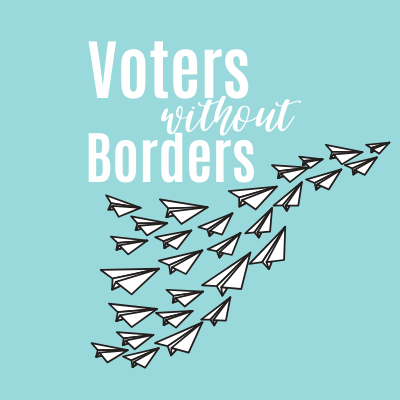
Sinead O'Keeffe is a member of the European citizens’ initiative “Voters Without Borders” which is campaigning to ensure EU citizens residing in a different Member States have full political right and can vote in national elections. Sinead is from Ireland and lives in Brussels. She started working for Voters Without Borders straight after her law studies.
In this interview for the ECI Forum, she explains why this issue is of particular importance for millions of Europeans, why she thinks the European Citizens’ Initiative might be the best tool to address it and what challenges the organisers had to overcome to get their Initiative registered and running.
Watch “Meet-And-Greet Initiative Organisers” with Sinead O'Keeffe and other organisers - or read the transcript of her full interview below.
Sinead: Starting from the freedom of movement, it doesn't make sense to me that you can move to another country and you can live in that society, if you have children you send your children to school there, you work there, you pay taxes, you go to the hospitals there, you take part in the community, you become part of the community, you're in a sports team there and you can't vote! It doesn't make sense to me.
I’m from Ireland and in Ireland actually we are one of five countries in the EU where we are disenfranchised once we leave our country. If I live outside of Ireland for 18 months I can't vote any longer in Irish elections, but I also can't vote in Belgian elections, so now therefore I can't vote anywhere. It just means: "I don't have my fundamental right of voting; and the voting is a right, not a privilege. It just doesn't make sense".
Q: Why did you choose the European Citizens’ Initiative as the instrument which can help you?
The European Citizens’ Initiative was brought into force in the in EU law in the chapter on non-discrimination and citizenship, so it just makes complete sense for our campaign, which is about political rights and non-discrimination.
When looking at the different tools of direct democracy available in the EU we have looked at petitions and lobbying - lobbying governments, lobbying the institutions but we've seen that the European Citizens’ Initiative tool is the best tool, especially for young people to get directly involved in EU policymaking.
Q: How difficult was it to get your Initiative registered?
We registered the European citizens’ initiative in January 2020, it was accepted in March, and we didn't launch straight away, which is a possibility made available with the new regulations. That came in as very handy because we didn't have to launch the second that we had been accepted by the Commission. We were able to take some time to a build up partnerships before we launched, so we launched September 1, 2020, so there was a really nice gap that we could build up the team and do a lot of research. That's also where the European Citizens’ Initiative Forum came in, because we did ask them, and got a lot of advice from them about the legal grounds and how to build up our strategy.
"If you're looking for advice on how to start a European citizens’ initiative I would say do not hesitate to contact the European citizens’ initiative Forum they will give you written advice, spoken advice they will involve you in webinars and different training sessions to cater to your every need".
Q: What is the most important lesson learned from the registration process?
Something that we learned was to take your time before actually launching the European citizens’ initiative. With the new regulation it's great that we were able to do that because I know other European citizens’ initiatives didn't have that opportunity, but that's been a massive bonus for us, because we got to build up our team, we got to look into different strategies and it also gave us a chance to get advice from other European Citizens’ Initiative stakeholders, other European citizens’ initiatives and civil society organisations on the best way to market ourselves.
Q: COVID has had significant consequences on the opportunities to campaign – how did you handle the challenge?
The COVID-19 pandemic has encouraged us to look at things that we normally take for granted in another way, for example reaching out to people. We're used to being able to see people on the street, get them to sign, so now our campaign is fully online and we don't meet even the team in person. We meet every morning on Slack, an online platform. When we get new team members, again we don't meet them in person, so it's been a real struggle. A way to combat this is through having morning meetings every single morning, keeping an open discussion, keeping it informal, and it really helps to make our campaign successful. When we moved our campaign fully online we also had to move events online, so we host webinars, we got different partners to speak at these, but the main way to promote these webinars is through social media.
Social media is the key to getting out to mobile citizens, all EU citizens. We have pages on Instagram, Facebook Twitter, LinkedIn. On Facebook, for example, we're part of groups like “Irish in Brussels”, “Germans in Rome”, “Berliners in Romania”, so all of these things are really important, and we also post on these quite often, because this is how we get responses. We talk to people in the comments on our posts and this is how we get people to sign really, and people to get involved in the campaign. We try to inspire people through writing articles, as well and posting them on Facebook. A large thing that we've been tackling has been Facebook advertisements. We've received advice from many different campaigners and organizations that this is one of the key ways to campaign during COVID. With Facebook we’ve been facing some challenges, because the nature of our campaign is political. This is political and social content, and Facebook has made some barriers against such advertisements, but we're tackling these. I think that's one of my main pieces of advice: definitely use Facebook advertisements, as this is a key way to get people on board the campaign, and to make it more widespread.
Q: What has been you experience with using the European Commission’s signature collection system?
Sinead: Our experience with the Commission's signature collection system has been very positive. When you click onto “Support Voters without Borders Initiative” you can see how signature collection in each country is going, which is very good. You can see the threshold, the amount of signatures that has to be collected in that country, and the percentage that has been reached. For example, when I go on it, I look at Ireland first of all of course, and I see four point something percent and I say, “Okay, maybe next week I want to be at five percent, next week I’m going to be six percent”, so from an organizer's point of view it's definitely very beneficial.
Something I think that's very important for organizers to know is that there are very much two sides to European citizens’ initiative, there's a kind of lobbying the European institution side, and then there's the general outreach side, getting in touch with the normal citizens. For lobbying the institutions, for example, it's very useful to contact Members of European Parliament’s offices, ring them up, do whatever you think is necessary and they actually will respond; and then on the other side of it, getting in touch with citizens, this is the more difficult part. You need to form strong partnerships with local communities, with small organizations. I think that's what we've seen has been most important to getting the average citizen involved, because most people don't know what a European citizen's initiative is.
For a European citizens’ initiative to be successful, you need to collect signatures from a minimum of seven Member States. For each of these member states there is a threshold, so for Ireland for example, the threshold is quite low, luckily enough, so it's a very good idea to target countries with this low threshold. In addition, we actually recommend not just to target seven member states because you need to collect one million signatures and that would be very difficult just from seven, so of course you should target key Member States maybe about 10 - 11 - 12 and focus on these and of course always try to get above and beyond the one million if it's possible. When we launched our Initiative, we used the European citizens’ initiative legal advice and advice for our campaign strategy and they provided written advice and also training sessions to us, and these have been invaluable to forming what we're doing…we're a European citizens’ initiative of young people, so we're not all extremely experienced campaigners and what they've provided to us has been very useful!
Watch “Meet-And-Greet Initiative Organisers” with Sinead O'Keeffe
Contributors
Sinead O'KeeffeSinead O'Keeffe is a member of the group of organisers of the European citizens’ initiative “Voters Without Borders
The opinions expressed on the ECI Forum reflect solely the point of view of their authors and can in no way be taken to reflect the position of the European Commission or of the European Union.




Leave a comment